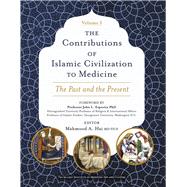The Contributions of Islamic Civilization to Medicine The Past and the Present
, by Syed, Mubin; Hai, Mahmood A.; Esposito, John L.- ISBN: 9798350932553 | 8350932554
- Cover: Hardcover
- Copyright: 1/17/2024
This is a wonderful, informative collection of essays tracing the roots of modern medicine back to an Islamic Golden Age. It opens with an insightful, contextualizing essay by Georgetown's Distinguished University Professor, Dr. John Esposito. With that one exception, the essayists are neither historians nor historiographers. Rather, they are contemporary Muslim scientists and physicians, whose expertise and point of view uniquely qualify them for the task. The fellow physician who inspired their work, Dr. Hussain Nagamia, is no longer with us, but his personal passion for the topic permeates these pages. His essay, near the start of the book, frames everything that follows.
Through rare texts and global travel, Dr. Nagamia spent decades pursuing a cohort of medieval physicians and scholars working in the long millennium of Islamic civilization. The era began eight centuries before the European Renaissance and ended overlapping it. Working in centers of learning like Baghdad and Cairo, these scholarly practitioners translated, critiqued, transcended, and transformed the early works of classical medical authorities, including Hippocrates and Galen, and quickly surpassed them.
Much of this origin story is recounted in the book's multi-part Introduction by Dr. Mahmood Hai, a noted urologist and friend of Dr. Nagamia's. His well-ordered segments synthesize thousands of factoids into a readable, digestible, thoroughly illuminating presentation of a group of tireless physicians and medical philosophers who, between the 7th and 15th centuries, established a practice of medicine based on observation and the scientific method. It focuses on thirty-one groundbreaking exemplars, whose names, based on their accomplishments, ought to be household words today.
Presented in thumbnail bio-sketches, these medieval explorers laid the groundwork for accurate diagnoses of thousands of maladies, for a pharmacopeia to treat them, for a mathematical understanding of optics, an imaginatively precise vision of human anatomy, of pulmonary circulation, and the proposition of an overall regimen designed to maintain health and restore it from weakness. Building on each others' insights over time, they successfully developed an approach to public health that led to the world's first real hospitals, and to the development of life-saving surgeries— all based on a single, prophetic principle, in essence an article of faith: that no disease exists for which there is not also a cure.
This able Introduction for the general reader paves the way for five further essays, three of them focused in greater detail on philosophical and ethical topics, including an exploration of the principles of hygiene, a study of the origins of modern medical ethics, and an examination of medieval contributions to the psychology of medicine and its practice. The fourth essay supplies a long-awaited study of Muslim female physicians and healthcare providers in Islamic History. The final essay, continuing a millennial trajectory of revolutionary thought and invention, introduces readers to a representative handful of modern Muslim medical professionals and their innovative contributions to various domains of medicine today.
Through rare texts and global travel, Dr. Nagamia spent decades pursuing a cohort of medieval physicians and scholars working in the long millennium of Islamic civilization. The era began eight centuries before the European Renaissance and ended overlapping it. Working in centers of learning like Baghdad and Cairo, these scholarly practitioners translated, critiqued, transcended, and transformed the early works of classical medical authorities, including Hippocrates and Galen, and quickly surpassed them.
Much of this origin story is recounted in the book's multi-part Introduction by Dr. Mahmood Hai, a noted urologist and friend of Dr. Nagamia's. His well-ordered segments synthesize thousands of factoids into a readable, digestible, thoroughly illuminating presentation of a group of tireless physicians and medical philosophers who, between the 7th and 15th centuries, established a practice of medicine based on observation and the scientific method. It focuses on thirty-one groundbreaking exemplars, whose names, based on their accomplishments, ought to be household words today.
Presented in thumbnail bio-sketches, these medieval explorers laid the groundwork for accurate diagnoses of thousands of maladies, for a pharmacopeia to treat them, for a mathematical understanding of optics, an imaginatively precise vision of human anatomy, of pulmonary circulation, and the proposition of an overall regimen designed to maintain health and restore it from weakness. Building on each others' insights over time, they successfully developed an approach to public health that led to the world's first real hospitals, and to the development of life-saving surgeries— all based on a single, prophetic principle, in essence an article of faith: that no disease exists for which there is not also a cure.
This able Introduction for the general reader paves the way for five further essays, three of them focused in greater detail on philosophical and ethical topics, including an exploration of the principles of hygiene, a study of the origins of modern medical ethics, and an examination of medieval contributions to the psychology of medicine and its practice. The fourth essay supplies a long-awaited study of Muslim female physicians and healthcare providers in Islamic History. The final essay, continuing a millennial trajectory of revolutionary thought and invention, introduces readers to a representative handful of modern Muslim medical professionals and their innovative contributions to various domains of medicine today.







